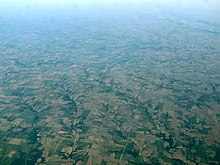Flyover country

Flyover country and flyover states are American phrases describing the parts of the contiguous United States between the East and the West Coasts.
The origins of the phrases and the attitudes of their supposed users are a source of debate in American culture; the terms are often regarded as pejoratives, but are sometimes "reclaimed" and used defensively.[1]
Definition
[edit]The terms refer to the interior regions of the country passed over during transcontinental flights, particularly flights between the nation's two most populous urban agglomerations: the Northeastern Megalopolis and Southern California. "Flyover country" thus refers to the part of the country that some Americans—especially those of urban, wealthier, white-collar status—only view by air when traveling and never actually see in person at ground level.[2][3]
See also
[edit]References
[edit]- ^ Bullard, Gabe (March 14, 2016). "The Surprising Origin of the Phrase 'Flyover Country'". National Geographic. Archived from the original on February 19, 2021. Retrieved May 30, 2023.
- ^ Cowan, Jane (March 10, 2012). "Landing in the 'Fly-over' country". ABC Radio. Retrieved September 1, 2019.
- ^ "Techies reject coasts for 'Silicon Prairie'". CNN. Retrieved September 1, 2019.
Further reading
[edit]- de Wit, Cary W. (2007). "Flyover country". In Sisson, Richard; Zacher, Christian K.; Cayton, Andrew Robert Lee (eds.). The American Midwest: an interpretive encyclopedia. Indiana University Press. pp. 66–68. ISBN 978-0-253-34886-9.
- Robertson, David (2004). "FLYOVER COUNTRY". In Wishart, David J. (ed.). Encyclopedia of the Great Plains. University of Nebraska Press. p. 386. ISBN 978-0-8032-4787-1.
